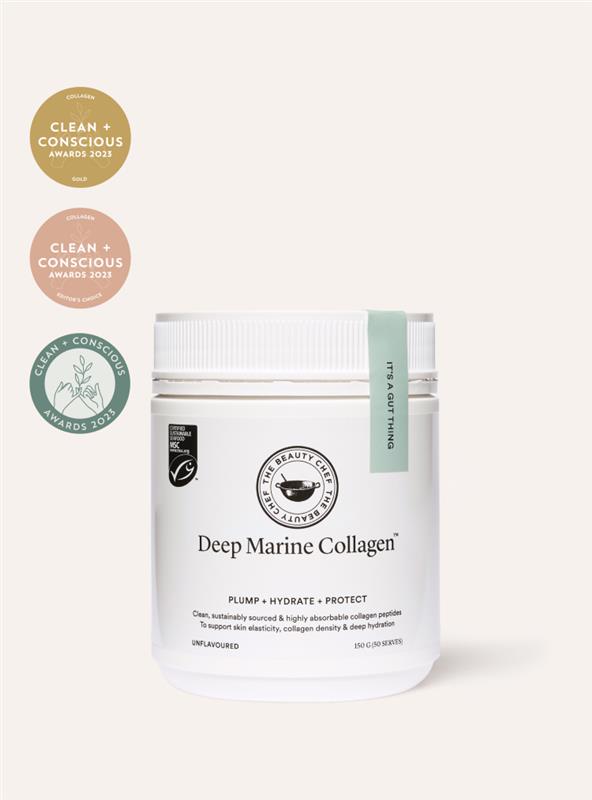
Collagen is the most abundant protein in our bodies—and it’s therefore essential that we help to protect and preserve our stores of it. Given that it also naturally declines as we age, whatever we can do to boost collagen production is undoubtedly a positive action we can take for our health.
Alongside The Beauty Chef team, I work closely with experienced naturopaths to research, develop and bring new products to life. So when it comes to the much-loved Deep Marine Collagen™—our 100% clean, MSC-certified and sustainably sourced marine collagen powder—who better than our naturopaths to help answer all your marine collagen-related queries.
Here, we break down what marine collagen actually is, the difference between the different types of collagen supplements available and why collagen is so good for your skin—as well as your gut...
What is marine collagen?
“Recently there has been a huge surge of interest in collagen supplements—specifically marine collagen. The key difference between marine collagen and ‘other’ collagen however, is where it comes from. Marine collagen derives from the skin of fish, whereas bovine collagen derives from the hides and hooves of cattle.
Deep Marine Collagen™ contains premium, clean and sustainably sourced marine collagen that comes from wild-caught, deep-sea North Atlantic cod.”
What does hydrolysed mean?
“Most collagen supplements on the market utilise hydrolysed collagen—which simply refers to the process used to obtain the collagen peptides found in the product. Using the example of marine collagen, the process of hydrolysis essentially breaks down the native marine collagen into smaller units of protein known as peptides. These compounds have a lower molecular weight and are therefore more easily absorbed by the body.
You’ll also notice a very slight yellowy hue to our marine collagen powder—it’s not pure white—and that’s because it hasn’t been overly processed with chemicals. Having undergone a more gentle hydrolysis process which doesn’t lead to a bleached looking white powder.”
Is marine collagen good for you?
“Absolutely! Incorporating a marine collagen supplement into your inner beauty routine is a simple and convenient way to include more collagen in your diet—which is particularly useful if you know you’re not consuming collagen-rich foods or the amino acids required to help build and preserve your own collagen stores.
The great thing about a product like Deep Marine Collagen™ is that it contains clean and certified sustainable marine collagen peptides, too. This means that as a consumer, you can be assured that the product has undergone a rigorous process to source and certify that the marine collagen used in the formula is as ethically sourced and sustainable as possible. We can also guarantee that it’s traceable as we receive a ‘batch certificate’ which tells us which boat the material came from.”
Why is collagen so beneficial for gut health?
“We know already that our gut is essential for our general health, beauty, immunity and overall wellbeing—so it’s vital that we do our best to nourish and nurture it at every opportunity. While there are myriad factors that impact and influence the state of our gut and microbiome—diet is arguably the one which has the most significant impact.
Collagen is a great way to support gut health as it contains amino acids that help to rebuild and strengthen the delicate lining of our digestive tract. These amino acids—in particular glycine and glutamine—are also anti-inflammatory and as ongoing inflammation in the gut is linked to inflammation elsewhere in the body, it’s certainly helpful to include an abundance of amino-acid rich foods—like bone broth, animal protein, eggs and dairy—in our diet regularly.”
How would I know if I’m getting the amino acids needed for collagen production?
“The best sources of amino acids are protein-rich foods such as animal proteins, eggs and dairy as well as animal parts that we don’t tend to consume everyday like chicken’s feet and foods that are rich in gelatin. So, if you don’t consume these types of foods regularly, it’s likely that you would benefit from including a collagen supplement in your daily routine. It’s worth noting that muscle meats and collagen contain different ratios of amino acids. Muscle meat is higher in methionine and is lower in glycine, whereas marine collagen is lower in tryptophan and higher in glycine. This illustrates how important it is to eat from all sources—muscle meat and marine collagen.”
In terms of The Beauty Chef products, what’s the difference between Deep Marine Collagen™, Glow® and Collagen Boost™?
“This is a great question and one that we considered closely before launching Deep Marine Collagen™. As with all of The Beauty Chef products, Glow®, Collagen Boost™ and Deep Marine Collagen™ are designed to work synergistically and are all able to be taken together. However, their key benefits and how they work in the body are what set them apart.
GLOW® is undoubtedly your daily essential—a product designed to be your all-rounder for improved gut health, beauty and overall wellbeing. Think of it like a pre, pro and postbiotic product—a multivitamin for your skin, gut and wellbeing. It forms the foundation of your routine and is intended to be enjoyed daily. It contains a variety of bio-fermented wholefoods, each selected for the gut and skin-boosting benefits.
COLLAGEN and Deep Marine Collagen™—both work to support collagen production—however they do this in different ways. COLLAGEN Inner Beauty Boost is a vegan elixir and does not contain collagen from animal or marine sources. Instead, it contains vitamin C and zinc—nutrients which are well known for helping the body produce collagen which is found in our skin and other parts of the body. Vitamin C also protects the skin from free radical damage, which is a factor that contributes to collagen degradation. Deep Marine Collagen™ on the other hand is a marine collagen powder that directly supplies the body with the amino acids required to build and boost collagen production. It assists with skin elasticity and firmness, healthy collagen density, skin hydration and also helps to prevent collagen breakdown in the skin. It also contains ellagic acid from pomegranate and grapeseed extract which studies show may help with collagen degradation.”
How many different types of collagen are there? And what’s the difference between type I, type II and type III?
“As an essential protein, collagen forms a structural framework throughout various parts of the body—and there have been about 28 different types of collagen identified to date. The different types of collagen (type I, II and III) simply refer to the varying properties and collagen fibers found within different locations in the body.
Our skin, for example, is constructed from connective tissue which contains collagen and elastin—providing its strength, suppleness and elasticity. Type I collagen is the most abundant type of collagen in the body and is more prevalent in the skin—while type II is more closely linked to connective tissue such as cartilage. The collagen in Deep Marine Collagen™ is type I.”
What are the key skin benefits of marine collagen?
“The sustainably sourced hydrolysed marine collagen in Deep Marine Collagen™ supports the skin by improving skin firmness and strength. It assists with skin elasticity, skin hydration, improves collagen density of the skin and also helps to preserve and protect skin from collagen degradation.”





